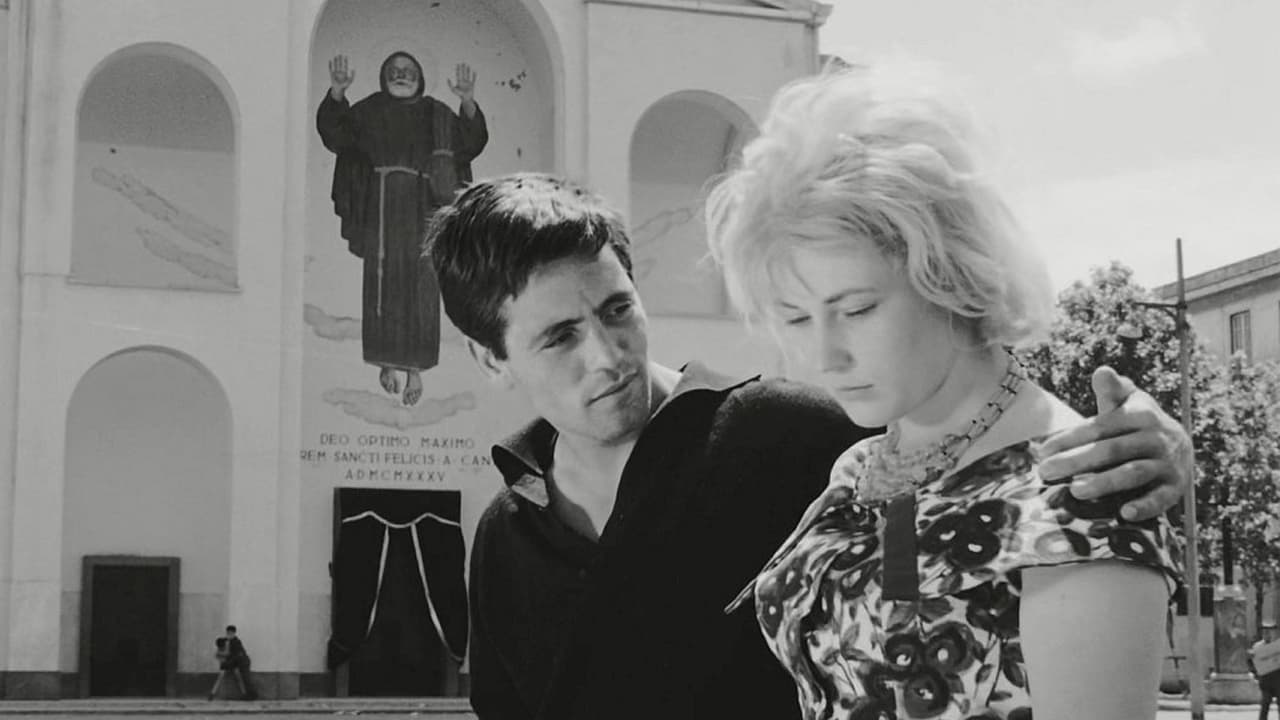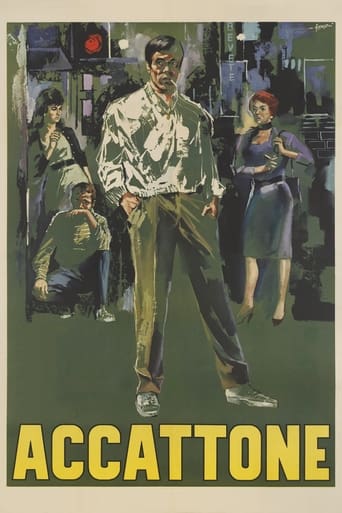

Pasollini's Accattone (1961) is a film that clearly shows the writer/director was not only uninformed, but even naive about the social situation to which his film related. This film is so detached from the slum life of the big city, and the realities of the life of pimps and prostitutes that it could better be called an example of Un-Realism, than Neo-Realism.This filmmaker couldn't even stage a good street fight, just showing two guys rolling around in the street locked in bear hugs.The protagonist's first prostitute is portrayed getting a broken leg, and is soon shown thereafter walking around with a cast on the leg, yet with no limp, or crutches. Sorry, but having a broken leg doesn't work that way.This first prostitute is shown getting badly beaten, yet then is shown in the police station without a bruise on her. Now that Neo-Un-Realism, if I ever saw it.That the protagonist is shown almost starving after his only hooker is jailed is just STUPID. Pimps are street savvy guys who have more than one girl in their stable, and are street smart enough to make money in a variety of ways besides pimping.I could go on and on, but what's the point? The costumes, the characters, and dialogue is nothing close to appropriate for the social situation that this film is supposedly portraying. This filmmaker obviously never entered the slums of a big city, and never met real pimps and prostitutes. He was making a supposedly realistic account of a social scene of which he was obviously ignorant.This is the first Pasollini film that I've viewed, and it's his first film that he made. But solely on the basis of viewing his first film, I really don't think that this guy showed enough here to merit a second chance.
... View MoreThis is still a masterpiece of a film you can not afford not to see if you like Pasolini. "Accattone" is the directorial debut of the Italian neo-realist, Pier Paolo Pasolini, but by a strange coincidence it ended up being the very last of all his movies that I saw. I had seen everything he ever did, including short films by the time I got to "Accatone" and still found it masterful. Franco Citti stars as the title character, he is a handsome pimp in Rome's post-war lower depths, with an endearing face that speaks volumes of his street-wise upbringing in the slums. To those unaccustomed with Southern Italian culture the way he spends his days with the other local pimps, playing cards and being lazy may seem vile, but it is actually a well grounded tradition, as is also his support of the entire family of his imprisoned friend, Ciccio, who depend on him for survival. He is obviously a fellow mobster, and their code of honor is at stake when Accatone discovers that he is in prison as a result of his whore, Maddalena, played by Silvana Corsini, who denounced Ciccio to the authorities. Even though she is recovering from a broken leg, Accatone forces her to go on the streets, where she is used, beaten and abandoned by Accatone's pals after he tells them the story, then she is found by the police and arrested. Accattone nearly starves to death from the total lack of income, he even sells all his jewelry to get by. He tries to reunite with his wife, with whom he has fathered at least one child, but she sees through his seduction act and her virile, beautiful brother beats up Accatone in an intense erotically-charged scene that seems to simulate sexual assault as much as violence between the men. After meeting the innocent and beautiful Stella, (Franca Pasut) he is smitten and tries to get a job, so he can support her and his family but he is not accustomed to hardship and has the lack of patience that is typical of spoilt types that have never been trained to work does not make the job last for very long. Never have I seen a more humane, direct and simple depiction of the tragic life of these undesirables of society. Pasolini is a master painter narrating with a few gestures all their hardship and suffering. Even getting a plate of food in this world is a memorable accomplishment. We see the whole setting as a sideline of modern society's inability to function properly. The 'corrections' by the police seem to be the most unjust of all, and Pasolini presents this panorama of human failing as an allegory of human struggle and spiritual redemption.
... View More"Accattone" was Pasolini's first film. Besides his huge engagement for the under-privileged, we have already here practically all motives that go like a "fil rouge" through Pasolini's whole work: The use of dialects and generally linguistic substandard instead of the literary language, the decision for the suburbs instead of the city, the atheist world in concurrence with a very often negative Catholic substrate, the mavericks who live at the edges of society in comparison to a bourgeoisie that turns out to be fascist in Pasolini's Marxist interpretation, and possibly also Pasolini's imperturbable belief in educating the uneducated, the illiterate, the so-called scum of society. (It is a more than tragic fact that while Pasolini in his real life even went so far as to have lectures in the slums in the front of an audience that could not understand him, he finally got a victim from exactly the same people who did accept him as he accepted them."Accattone" is the story about a wasted, senseless and hopeless life. The title-hero leaves his wife and children in order to become a pimp. With his colleagues he spends his days drinking, gambling, betting. He does not mind to send back to street-walking his severely hurt prime-whore "Maddalena". In the night he dreams that he is dead and forbidden to attend his own funeral. On the other side, he squeals on his friends for a plate of pasta. For a short time there is light in Accatone's dark life: He meets Stella, the "star", and spoils her with gifts that he pays from the money of items robbed from his own son. However - and here we have a "prodromus"-motive from "Mamma Roma" - Accattone learns that Stella, too, was a whore once. So he forces her to street-walking, too. But he forgot Maddalena while she had not forgotten what he had done to her. When she hears from Accattones new luck, she gives the police a tip. Now they can observe him and his gang during a major robbery. Before they catch him, he tries to flee, but dies by driving with full-speed into a truck. While he lies dying at a curb of the street, one of his colleagues makes the cross-sign with handcuffed arms. Accattonne - the "Anti-Christ" or better "Counter-Christ" in the word's most original sense. Pasolini himself wrote: "I wish that only very few people will see in the crossing at the end a sign of hope".
... View MorePasolini's first film "Accatone" is exactly as one would expect a typical Pasolini film to be: wreathed in raw violence, and shot with a brilliant sense of poetic slash brutal realism, reminiscent of the neo-realism era, and perhaps, if not for sure, a semi-autobiographical portrait of life in the streets of Rome's peripheries. "Accatone" is, at its best, a chunk of life, which Pasolini managed to extract not as it initially was, but dramatically filtered through his own personal lyrical gaze. Gangs, prostitutes, lies and deceit lie in this film's core. A sense of irresponsible opportunism is seen in this film, almost no regrets for the past and no fears for the future. In fact, the movie's tragic hero, Vittorio Accatone, is a dark alter-ego of yet another favored Italian movie character, embodied only a year before by Marcello Mastroianni in "La Dolce Vita". Perhaps, in this case, Accatone was not a party animal journalist who sought ephemeral pleasure in social middle-class gatherings and women, but the spirit is, by itself, maintained astonishingly faithfully: Accatone is no longer a protagonist in Pasolini's movie, doomed to descend lower and lower in social class, losing both his dignity, his social acceptability and his profound "style", but a symbol, a metaphor for Pasolini's own political beliefs. Under this figure of a brute, behind the otherwise repelling image of a short dirty man with a sly smile and a peculiar walk, lies the failure of post war Italian government, a government which, according to this movie's subtext, strove so hopelessly to attain social and economical success for Rome's population, and somehow neglected or marginalized Rome's peripheries, causing people like Accatone and his girlfriends to result in prostitution and theft. A kind of pretension and make-belief well being which was also visible, at the time, in America. Yes, Accatone is the result of this American Dream's pastische.
... View More